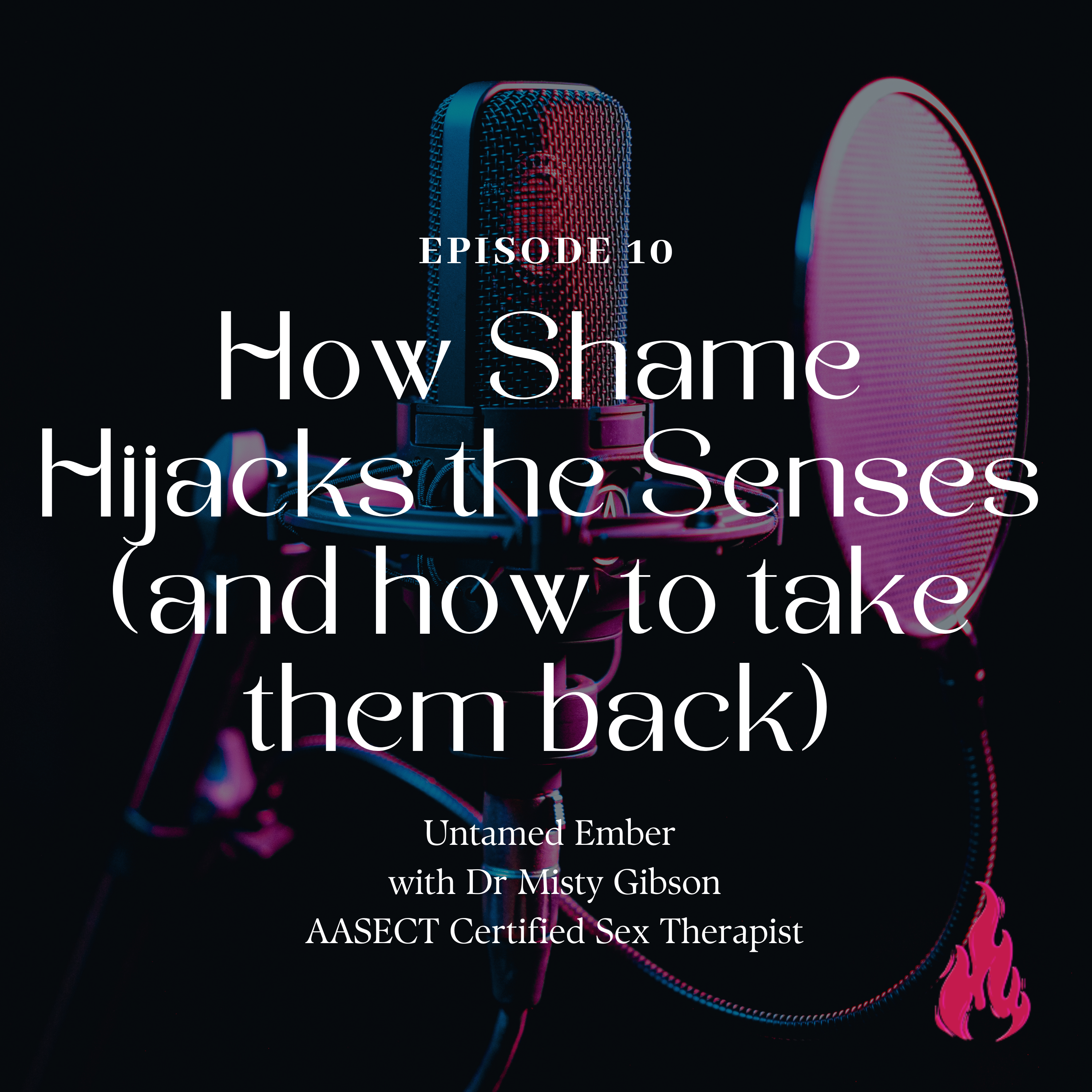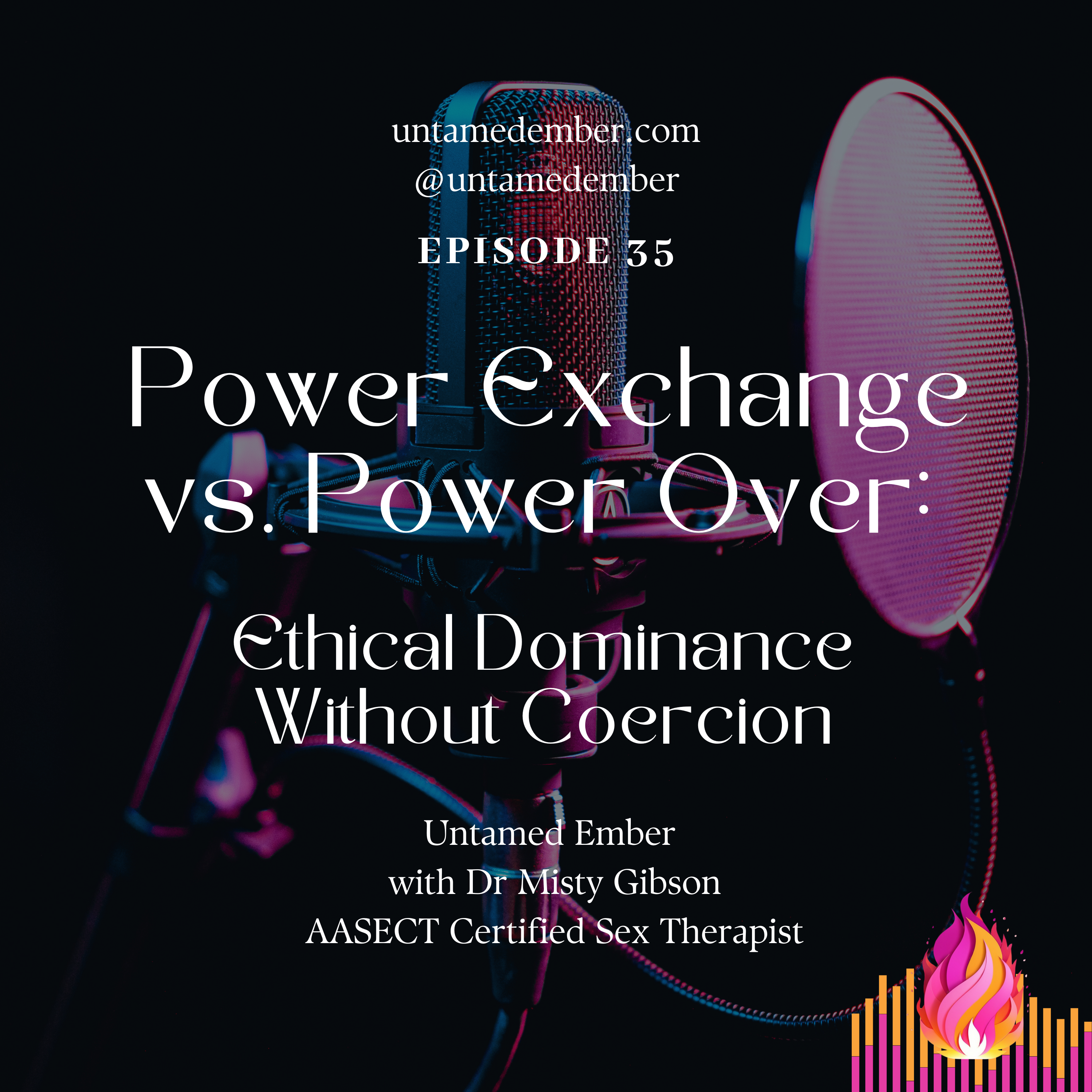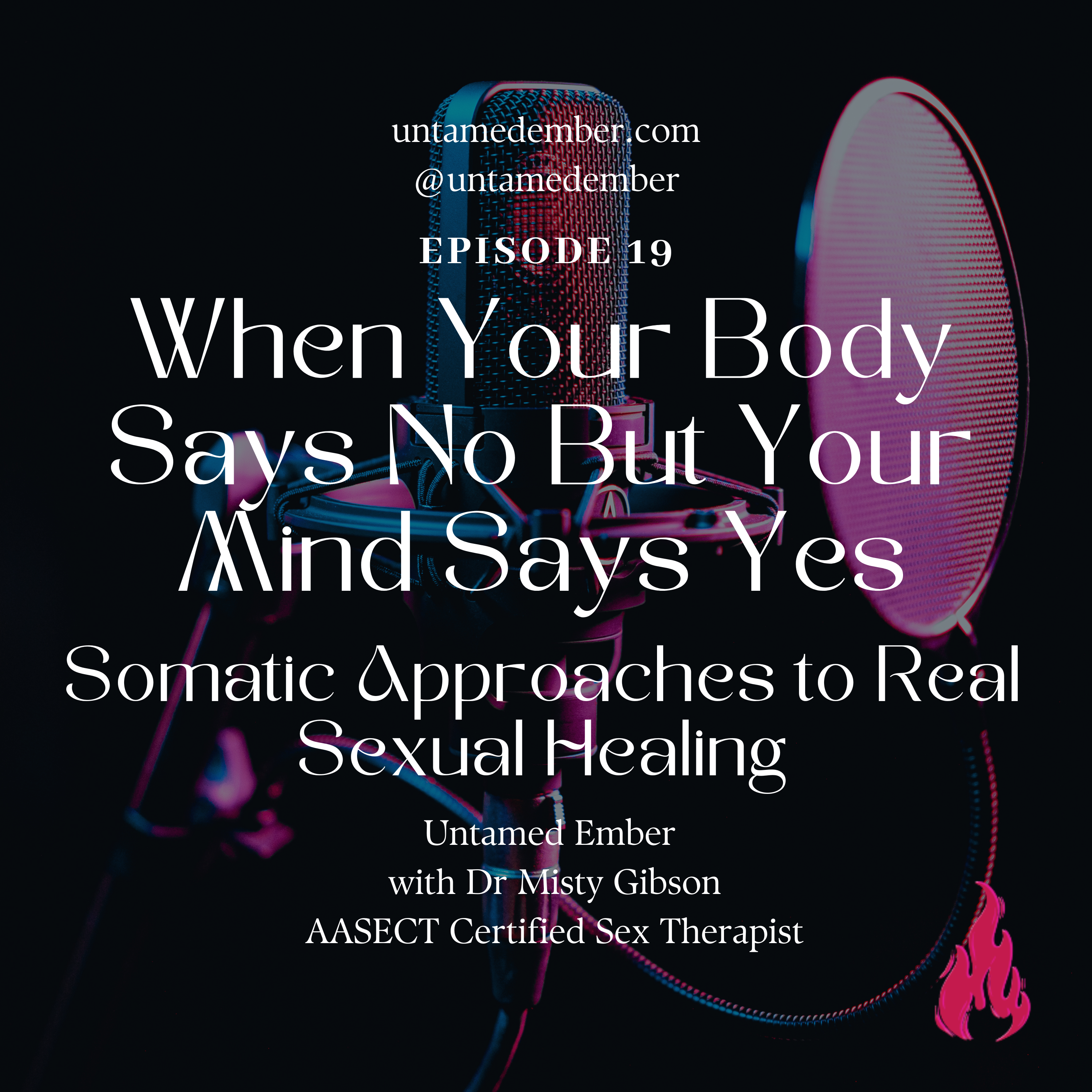Episode Transcript
[00:00:00] Foreign.
[00:00:12] Hey love. Welcome back to Untamed Ember, the podcast where we dismantle shame with science, dry hump the patriarchy and give your nervous system the warm consensual hug it's been begging for. I'm Dr. Misty, your resident sex therapist, trauma brain decoder and erotic liberation nerd. And today we are getting a little nerdy, a little squirmy, and a whole lot sensual. We're talking about how shame hijacks your senses and how to slowly, rebelliously, deliciously take them the fuck back. Because let's be real, if you've ever checked out during sex dissociated while trying to feel sexy or mentally added sex suck in stomach to your to do list mid orgasm, you are not broken. Your nervous system is just doing her overachieving job. Let's break that down and then build it back up with a little help from polyvagal theory, somatic play, and some spicy ass brain science.
[00:01:19] Lets talk about shame not as a feeling, but as a full body, full brain hijack. Because when shame shows up, it doesn't knock politely. We're talking brain chemistry, nervous system hijinks, and a hormonal shitstorm that could make even the chillest person start googling. Am I broken or is this just late stage capitalism? First up, the limbic system. This is the emotional command center of your brain. The the drama queen with a clipboard and no chill. It handles things like memory, motivation and emotional regulation. Basically, it's the part of your brain that screams we have a feeling about this before you've even figured out what this is. Within that system lives the amygdala, a little almond shaped region buried deep in your temporal lobe. Think of her like your inner security alarm, constantly scanning the room for threat. Even if the threat is you thinking about asking your partner for more clit stimulation. Now here's the thing. When you were shamed for your body, your pleasure, your hunger, your needs, your amygdala logged that as danger. And the next time something felt similar, it didn't matter if you were in a safe, consensual, joyful moment. That almond shaped alarm bell was like, oh hell no. Not today. Shut it down. That's when cortisol enters the chat. Cortisol is your main stress hormone. It's supposed to help you survive actual threats like running from a bear or a Republican debate. But in shame, that cortisol spike happens in response to a perceived threat. And the threat doesn't have to be physical. It can be social, emotional, internal. It can be the Threat of being seen as too much, the threat of being rejected for wanting something, the threat of not being wanted at all. So now, with your amygdala freaking out and cortisol flooding your system, your prefrontal cortex, the logical decision making, planning part of your brain is like, you know what? I don't need the stress. And peace is out. Which means all that reasoning like, I'm safe right now. I can say, no, I deserve to feel good. It goes poof. Now you're left with a body stuck in panic mode, a brain that's hit the overdrive button, and a sexual situation that suddenly feels like an emotional fire drill. Oh, and if you grew up in a trauma heavy or shame heavy environment, that prefrontal cortex of yours might have literally developed differently. Childhood trauma impacts the maturation of the prefrontal cortex, leading to a delayed ability to regulate emotion, make decisions under stress, and feel safe in vulnerability. Which is why even if your adult self knows you're safe, your body is like hard pass. We've seen this episode before, and it ends in abandonment, judgment, or weird eye contact with a youth pastor.
[00:04:11] Enter the polyvagal theory. Our nervous system MVP. According to Dr. Stephen Porges, your nervous system has a hierarchy of responses to stress, Safe and social equals regulated, curious and grounded, fight or flight equals mobilized, anxious and activated, and freeze or fawn equals shutdown, dissociated or compliant. When you experience shame, your vagus nerve, that long wandering nerve that connects your brain to your body, it kicks into protect mode. You might go into fawn, which means performing, appeasing, prioritizing someone else's comfort, or freeze mentally checking out, going numb, or defaulting to autopilot. And when this happens during sex, babe, your body might be saying yes with movement, but screaming, please protect me underneath it all. So what does this all mean if you dissociate during sex? If you can't stay in the moment long enough to enjoy what you know you like, if pleasure feels fleeting, foreign, or fucking terrifying, you're not broken. You are brilliant. Your body is adapting, and you don't need to be fixed. You need to feel safe enough to come home to yourself. The shame response is real. The science is real. And here's the best part. Neuroplasticity is also real, and we can work with it.
[00:05:34] Let's talk about sensory disconnection. The part where your body pulls the eject lever mid pleasure and your brain floats off like a confused Roomba. You're not not there, but you're also kind of watching yourself from the ceiling. Like, ma'am, what are we doing? If this is you, babe, you're not alone and you're definitely not broken.
[00:05:58] What even is sensory disconnection? At its core, sensory disconnection is when your nervous system says too much. Not safe, abort mission. And instead of feeling your body, you start observing it from the outside. Like a weird TikTok filter for your own genitals. It's not a conscious choice, it's a protective mechanism. Your body's way of trying to keep you safe by disconnecting you from sensation, emotion or both. And it can show up in all kinds of spicy ways, dissociating during sex, even when you want to be there mentally checking out while someone touches you. Feeling like pleasure is happening to you, but not with you hyper focusing on your partner's reaction instead of your own. Thinking about laundry text or what your thighs look like instead of staying present. That my love is not low desire. That is nervous system patterning. So why does this happen? Because your nervous system remembers what your conscious brain forgot. It remembers that time when someone commented on your body in your stomach sank. That purity culture lesson about lust equals sin. That awkward moment where your desire was rejected, laughed at or dismissed. The times when you faked pleasure so you wouldn't feel guilty for not performing right. Those moments don't just disappear, they get stored. They get filed under. Do not touch. This shit hurts. And when something feels too close to those past experiences, even a good thing, your brain hits the switch. Disconnect to protect. And this isn't just emotional, it's physical. When your body perceives a threat, even a subconscious one, you may experience a reduced vagal tone, which means your nervous system can't regulate or return to safety easily. It feels like numbness or detachment from sensory input. Touch doesn't register as pleasure. It could feel like shallow breathing, tight muscles, a clenched jaw. Basically your body preparing for rejection instead of reception. It's not that you don't want to feel good. It's that your body has associated feeling good with getting hurt. Honestly, that's fucking tragic. But also it makes sense because for many of us, pleasure was either over policed. Don't touch that. Keep your legs closed. Performative. Make him feel like a king. Or. Or punished. You deserve it for wearing that. So now your system goes feeling too good. That's suspicious. Better freeze.
[00:08:22] So let's paint a picture. You're mid makeout. You're into it. Kinda. Except now you're thinking about how your stomach folds when you're on Top. Or if you're being too much, or if they can tell you're not really there, you keep going. You even moan a little, because that's what you do, right? And afterward, you feel tired, disconnected, weirdly hollow. That, babe, is sensory disconnection. Not because you're bad at sex, not because you're low libido, but because your body was trying to protect you in the only way that it knows how. By turning the volume down on pleasure.
[00:09:05] So what do we do about it? First, we name it. Because naming a pattern is the first step to breaking it. Second, we create safety. Not perfection, not performance. Just enough nervous system space to stay present for one more second than you used to. Third, we get weird with it. Because healing doesn't happen in beige. It happens in body glitter, snack breaks, and slow, weird, joyful experiments.
[00:09:39] Okay, babe, you've got a trauma brain. Welcome to the club. Our jackets are nervous system regulated, and our motto is, that's not dysfunction. That's adaptation, bitch. But here's the thing no one told you in sex ed, probably because your sex ed was taught by a volleyball coach with a moral purity slideshow. Your brain can rewire itself. And that, my love, is the key to reclaiming pleasure. Not as something you earn, but something you train your body to trust again.
[00:10:17] So what the hell is neuroplasticity? Glad you asked. Neuroplasticity is your brain's ability to adapt and change based on experience. It's the reason you can learn new skills, heal from trauma, or suddenly crave oat milk after a decade of mocking vegans. Your brain is not cement. It's silly putty with a God complex. It reshapes itself in response to what you repeat with intention and emotionally charged experience. Which means if you grew up internalizing shame every time your body felt good, your neural circuits literally linked. Pleasure equals danger. But the very pathways that taught your body to flinch can also teach it to fucking bloom. Here's how erotic rewiring actually works. Think of your brain as a path through the woods. The more often you walk a path, the more worn and automatic it becomes. That's your shame loop. Your performance loop. Your. Your stay safe by checking out loop. To create new paths, you need these. Repetition, emotion, and safety. Repetition, as in doing it more than once. Emotion, as in feeling it in the body and not just thinking about it. And safety. Because the brain does not wire in curiosity during stress. You don't need a grand awakening to start this. You need small, sensual moments of presence. And this is where science gets Intimate pleasure becomes a practice and the neural magic begins. Here are some legit nerd backed ways to start rewiring your erotic brain. Number one. The 30 second sensation scan once a day, pick one body part, your neck, your thigh, your belly and just feel it, touch it. Notice temperature, texture and tension. No goal, no pressure. Not making it sexual. Just noticing is the start of that new circuit. Studies show that interoception, your ability to feel what's happening inside of your body, is directly tied to self awareness and emotional regulation. 2. Safe Touch Rehearsal if you tend to disconnect during intimacy, try practicing touch on your own while grounded, clothed and fully in control. Not masturbation, unless you want it to be. Just a rehearsal of Here is what it feels like to be touched without expectation. This retrains the vagus nerve to interpret touch as safe. Instead of threatening pleasure without a purpose every day, try one act of sensuality that has no outcome attached. Dance to a song and let your hips lead. Eat something slowly with your fingers. Rub lotion on your thighs and say you're fucking welcome. That moment of presence. That's new neural territory. Because when you train your brain to expect safety, aliveness and joy, your brain literally begins to favor those circuits over the ones built on shame. Your vagus nerve is the nerve of connection. It tells your body if you're safe to feel, move, speak or receive. When you're stuck in a shutdown or a fawn state, the goal isn't to force arousal. It's to invite curiosity. Ask your body what helps me feel safe enough to notice sensation? What makes me want to stay in my body for one more breath? That one breath, that's the rewiring. That moan you didn't force, that's the resistance. That moment you didn't flinch away from a compliment. That's the blueprint. Changing foreign so here's the tldr. You are not broken. You are brilliantly adapted. And your brain is ready to unlearn shame and rebuild a relationship with pleasure. Not based on performance, but based on presence. And if all of this science is making your nipples hard, good, that means it's working. Here's the deal, babe. Shame isn't your personality trait. Disconnection isn't your identity. And being too sensitive or too much isn't some medical diagnosis you need to fix. It's what happens when you've been taught to shrink. Every time you light up, your nervous system isn't malfunctioning, it's reacting to a lifetime of bullshit messaging. We're talking purity culture that framed your desire as dirty diet, culture that taught you to fear your own appetite, neurotypical norms that made your arousal pattern feel like a glitch in the matrix. It's not your job to fit into systems that were never built for you. Your job, if anything, is to blow that shit up and build something better from the ashes. And guess what helps you do that feeling. Every time you choose to stay with a sensation instead of checking out. That's a fucking revolution. Every time you notice what feels good without needing a performance review from your inner critic, that's reprogramming. Every time you laugh mid orgasm or cry during a stretch and don't apologize for either, that's healing on your terms.
[00:15:12] Here's a quick update about Untamed Ember. We've moved all of our goodies out of the mighty network and into our brand new Ember Vault, your personal pleasure lab and rebellion library. When you join us for just $15 a month, you get weekly podcast companion worksheets, science backed activities, rituals and sensory play challenges and reflection prompts that are never boring and always a little spicy. A growing on demand access to our course library and future members only podcast episodes and live workshops. This week's worksheet is called Fuck around and Find out what Feels Good Inside. You'll find science backed ways to rewire your pleasure responses, somatic prompts that don't involve beige mindfulness, and exercises that flirt with your nervous system while you rebuild safety from the inside out. Get it inside the Ember vault@untamed ember.com and one last nudge before you hit pause. Where does your body still hold shame like it's trying to protect you? What's one sensory moment you could stay with just for one breath longer than you usually would? No performance, no goal. Just presence. That's where your rewiring starts.
[00:16:29] All right, babe, stretch something. Moan at your snacks. Make eye contact with your own brilliance. Your body is not a battleground. Your erratic brain isn't broken, it's just been interrupted. Let's make them uncomfortable and let's do it with glitter and science. See you next week for another episode of Untamed Ember.




